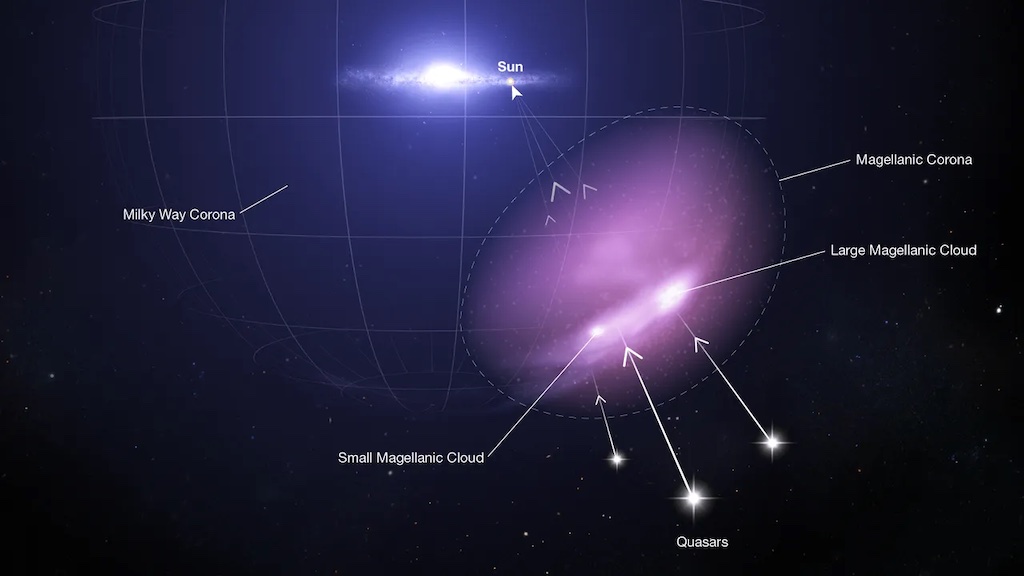Astronomical objects shouldn’t be named after ‘murderer and slaver’ Magellan, says Fil-Am astronomer

Photos from Mia de los Reyes/Amherst College and European Southern Observatory (ESO)/Wikimedia Commons
“I and a coalition of astronomers are calling for the scientific community to rename these galaxies, as well as other astronomical objects, institutions, and facilities that bear his name,” said Filipino-American astronomer Mia de los Reyes of Amherst College in Massachusetts in an article published in the journal APS Physics this week.
De los Reyes and the astronomers are referring to the Large and Small Magellanic Clouds, two of the brightest smaller satellite galaxies that surround the Milky Way.
“The beauty of these starry objects is clouded by their names, which honor a man who was a colonizer, a slaver, and a murderer,” she wrote. “We would like the International Astronomical Union—the body in charge of naming astronomical objects—to rename the Magellanic Clouds.”
Other than said satellite galaxies, Ferdinand Magellan’s name is also attached to astronomical objects like a lunar crater and a Martian crater, both named Magalhaens; the NASA Magellan spacecraft; the twin 6.5-meter Magellan telescopes; and most recently, an under construction, next-generation gargantuan telescope called the Giant Magellan Telescope.
Indigenous knowledge predates Magellan’s ‘discovery’

The Magellanic Clouds, dwarf galaxies roughly 160,000 light years from Earth, are the largest of the Milky Way’s satellites and are thought to be on their first in-falling passage around the Milky Way | Photo from NASA
In the article, the astronomers also argued that long before the Portuguese explorer’s team documented two groups of stars that looked like clouds in the Southern night during the first circumnavigation of the globe 500 years ago, Indigenous peoples across the Southern Hemisphere already had names and even legends for these systems.
This Indigenous knowledge, de los Reyes said, predates Magellan by thousands of years. “Magellan was no astronomer, and he was not the first to document these galaxies.”
You may also like: The Magellan-Elcano expedition had food for 2 years. A new book lists their feasts in the country when they ran out
Among the monickers that Indigenous peoples had for these satellite galaxies was “Rvganko” or water ponds by Mapuche of modern-day Chile and Argentina. Meanwhile, the Kamilaroi of modern-day Australia regard the galaxies as places where people go after death, and the Arimi of modern-day Tanzania see the clouds as a man and a woman, who help bring heavy rains during the rainy season.
Colonizer, a slaver, and a murderer
Albeit not an astronomer, Magellan has been—and continues to be—widely honored by the field of astronomy, de los Reyes continued. In her work as an assistant professor of astronomy at Amherst College, Massachusetts, studying low-mass galaxies in the nearby universe, she and her colleagues noticed that Magellan’s name currently appears in over 17,000 peer-reviewed academic articles.
All this even though his horrific acts of colonialism, murder, and slavery are documented as history in the first-hand account of his expedition by Antonio Pigafetta.
You may also like: Looking back 500 years
His atrocities are often glossed over by the fact that Magellan led the first circumnavigation of the globe 500 years ago. Never mind that in all of the almost three years it took for him to do that, he and his men enslaved the native Tehuelche people of what is now known as Argentina, and burned villages and killed their inhabitants in what would become Guam and Philippines.
“When we uphold the names of people, such as Magellan, whose lives and legacies have actively caused harm, we alienate the communities who have been harmed,” de los Reyes said. “The communities that suffered because of Magellan have rich astronomical traditions that are often less valued than Western ones.”

